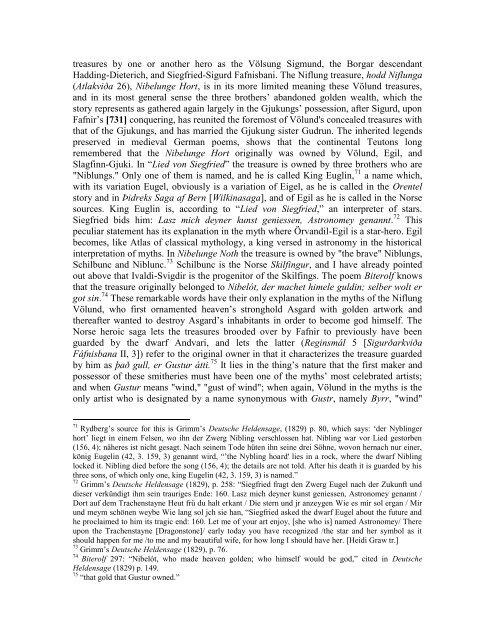Chapters 114-123 - Germanic Mythology
Chapters 114-123 - Germanic Mythology
Chapters 114-123 - Germanic Mythology
Create successful ePaper yourself
Turn your PDF publications into a flip-book with our unique Google optimized e-Paper software.
treasures by one or another hero as the Völsung Sigmund, the Borgar descendant<br />
Hadding-Dieterich, and Siegfried-Sigurd Fafnisbani. The Niflung treasure, hodd Niflunga<br />
(Atlakviða 26), Nibelunge Hort, is in its more limited meaning these Völund treasures,<br />
and in its most general sense the three brothers‘ abandoned golden wealth, which the<br />
story represents as gathered again largely in the Gjukungs‘ possession, after Sigurd, upon<br />
Fafnir‘s [731] conquering, has reunited the foremost of Völund's concealed treasures with<br />
that of the Gjukungs, and has married the Gjukung sister Gudrun. The inherited legends<br />
preserved in medieval German poems, shows that the continental Teutons long<br />
remembered that the Nibelunge Hort originally was owned by Völund, Egil, and<br />
Slagfinn-Gjuki. In ―Lied von Siegfried‖ the treasure is owned by three brothers who are<br />
"Niblungs." Only one of them is named, and he is called King Euglin, 71 a name which,<br />
with its variation Eugel, obviously is a variation of Eigel, as he is called in the Orentel<br />
story and in Þidreks Saga af Bern [Wilkinasaga], and of Egil as he is called in the Norse<br />
sources. King Euglin is, according to ―Lied von Siegfried,‖ an interpreter of stars.<br />
Siegfried bids him: Lasz mich deyner kunst geniessen, Astronomey genannt. 72 This<br />
peculiar statement has its explanation in the myth where Örvandil-Egil is a star-hero. Egil<br />
becomes, like Atlas of classical mythology, a king versed in astronomy in the historical<br />
interpretation of myths. In Nibelunge Noth the treasure is owned by "the brave" Niblungs,<br />
Schilbunc and Niblunc. 73 Schilbunc is the Norse Skilfingur, and I have already pointed<br />
out above that Ivaldi-Svigdir is the progenitor of the Skilfings. The poem Biterolf knows<br />
that the treasure originally belonged to Nibelót, der machet himele guldin; selber wolt er<br />
got sin. 74 These remarkable words have their only explanation in the myths of the Niflung<br />
Völund, who first ornamented heaven‘s stronghold Asgard with golden artwork and<br />
thereafter wanted to destroy Asgard‘s inhabitants in order to become god himself. The<br />
Norse heroic saga lets the treasures brooded over by Fafnir to previously have been<br />
guarded by the dwarf Andvari, and lets the latter (Reginsmál 5 [Sigurðarkviða<br />
Fáfnisbana II, 3]) refer to the original owner in that it characterizes the treasure guarded<br />
by him as það gull, er Gustur átti. 75 It lies in the thing‘s nature that the first maker and<br />
possessor of these smitheries must have been one of the myths‘ most celebrated artists;<br />
and when Gustur means "wind," "gust of wind"; when again, Völund in the myths is the<br />
only artist who is designated by a name synonymous with Gustr, namely Byrr, "wind"<br />
71<br />
Rydberg‘s source for this is Grimm‘s Deutsche Heldensage, (1829) p. 80, which says: ‗der Nyblinger<br />
hort‘ liegt in einem Felsen, wo ihn der Zwerg Nibling verschlossen hat. Nibling war vor Lied gestorben<br />
(156, 4); näheres ist nicht gesagt. Nach seinem Tode hüten ihn seine drei Söhne, wovon hernach nur einer,<br />
könig Eugelin (42, 3. 159, 3) genannt wird, ―‘the Nybling hoard' lies in a rock, where the dwarf Nibling<br />
locked it. Nibling died before the song (156, 4); the details are not told. After his death it is guarded by his<br />
three sons, of which only one, king Eugelin (42, 3. 159, 3) is named.‖<br />
72 Grimm‘s Deutsche Heldensage (1829), p. 258: ―Siegfried fragt den Zwerg Eugel nach der Zukunft und<br />
dieser verkündigt ihm sein trauriges Ende: 160. Lasz mich deyner kunst geniessen, Astronomey genannt /<br />
Dort auf dem Trachenstayne Heut frü du halt erkant / Die stern und jr anzeygen Wie es mir sol ergan / Mir<br />
und meym schönen weybe Wie lang sol jch sie han, ―Siegfried asked the dwarf Eugel about the future and<br />
he proclaimed to him its tragic end: 160. Let me of your art enjoy, [she who is] named Astronomey/ There<br />
upon the Trachenstayne [Dragonstone]/ early today you have recognized /the star and her symbol as it<br />
should happen for me /to me and my beautiful wife, for how long I should have her. [Heidi Graw tr.]<br />
73 Grimm‘s Deutsche Heldensage (1829), p. 76.<br />
74<br />
Biterolf 297: ―Nibelót, who made heaven golden; who himself would be god,‖ cited in Deutsche<br />
Heldensage (1829) p. 149.<br />
75 ―that gold that Gustur owned.‖
















